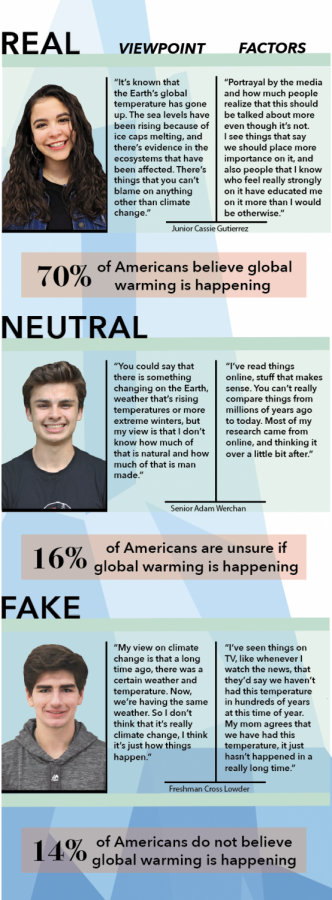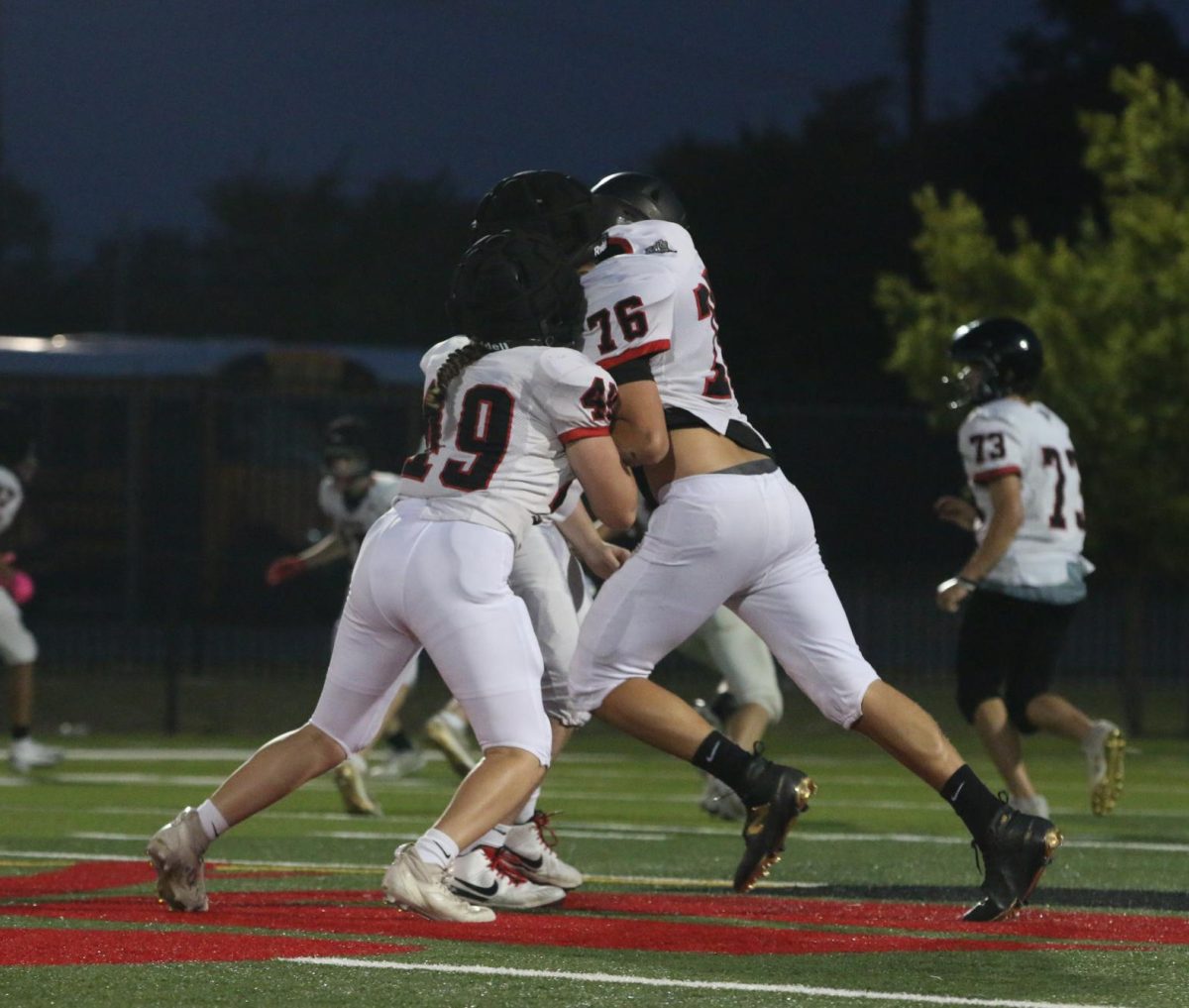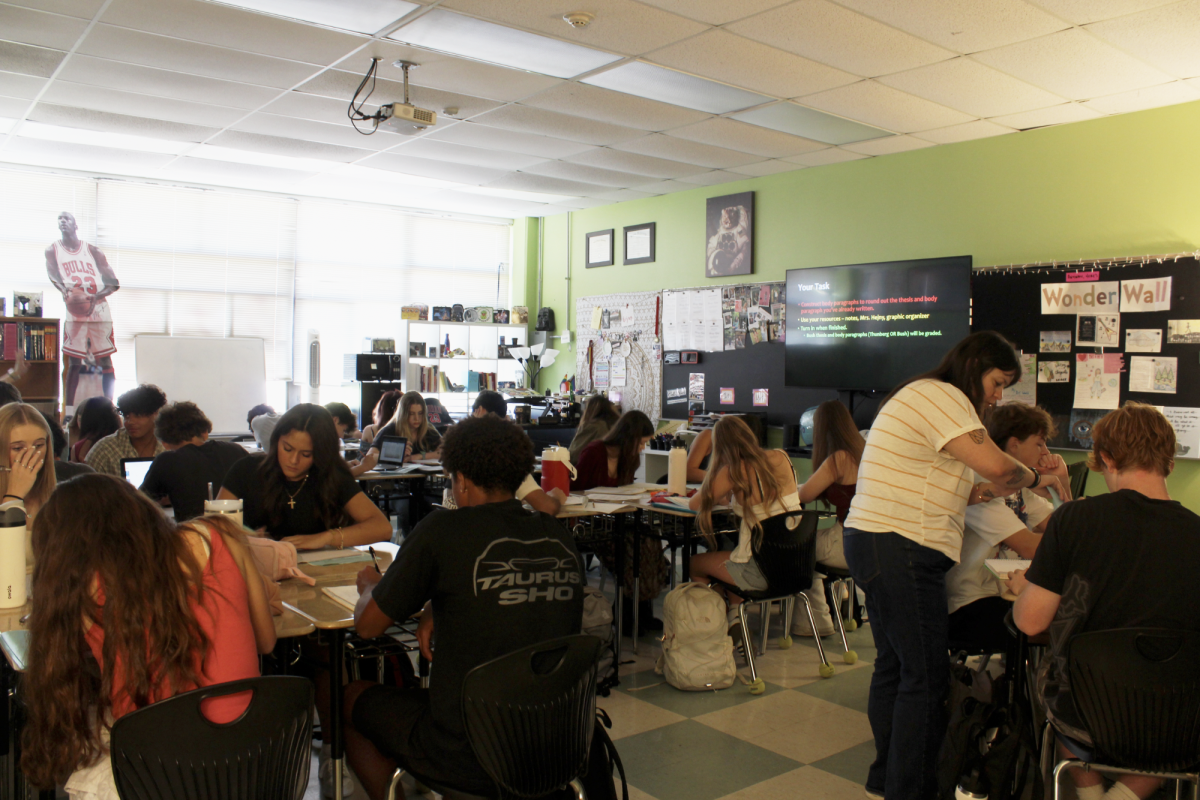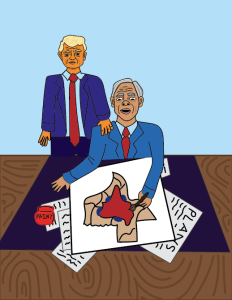Climate Change
Unusual weather events revive discussion on the increasing global problem
Students share their viewpoint on climate change and their opinions about the changes that could be done to prevent the warming of our earth.
April 29, 2019
Raging waters run through cities, destroying homes and businesses. Wildfires burn down decade old forests, devastating vegetation and animal habitats. Experts agree that these occurrences have resulted from climate change, which has people debating the importance and overall validity of the global phenomenon.
Uncommon weather patterns have sparked awareness for the impact human populations are having on Earth. AP Environmental Science teacher Ashley Spiro emphasized some primary causes of climate change.
“Climate change is caused by greenhouse gases, predominantly carbon dioxide, which stays in the atmosphere for hundreds of years,” Spiro said. “Greenhouse gases we release from burning fossil fuels, from animal agriculture, and from a variety of other different things have together resulted in a warming of our planet.”
City of Austin Climate Program Manager Zach Baumer expressed concern as greenhouse gases continue to be released into the atmosphere. He believes it is critical to focus on finding solutions worldwide.
“Right now, we are already seeing the effects of climate change in the form of extreme weather, like extreme heat, flooding, wildfire, and drought,” Baumer said. “We’ve already lost lives, homes, and native habitat to climate change, and if we do nothing, it will continue to get worse.”
Climate change can be described as a positive feedback loop, where small actions can lead to an increase in the magnitude of the problem. To Spiro, while this positive feedback loop poses a complex problem, it is a problem that needs to have a viable solution soon.
“I think [people] should be incredibly concerned because the worse case scenario makes a lot of Earth unlivable,” Spiro said. “It means people will have to move, it means that resources are going to become scarce, and it means that very bad times are ahead.”
Earth Club president Morgan Scrimgeour believes that people in the United States don’t put as much thought into the topic of climate change as people in other countries. According to Scrimgeour, this is partially because the presence of influential and powerful businesses can make the actions of one person seem insignificant.
“We talk about it, but at the same time we don’t care enough to change what we’re doing to fix our climate problems,” Scrimgeour said. “I feel like some people think that their voice is insignificant against bigger corporations, so they decide that they’re not going to try anything.”
Differing Opinions
According to NASA, the planet’s average surface temperature has increased by 1.62°F since the late 19th century. Along with this, the top 700 meters of the ocean have proven to be more than 0.4°F warmer since 1969. Despite the ample credible information, some people have chosen to remain skeptical on the true nature of climate change.
“I feel like it’s something that you can’t deny happens, climate change is there,” junior Cassie Gutierrez said. “I think it is an issue that should have more importance in our society, but it doesn’t, and people don’t care enough about it or aren’t exposed to the topic enough.”
While fierce debates about climate change are common, some have decided to accept people’s differing beliefs instead of challenging them. Spiro teaches climate change by presenting the facts and allows students to draw their own conclusion without being forced toward one side.
“It’s very difficult to convince people that they’re wrong when they already believe something,” Spiro said. “I don’t feel like those people are in the majority, and I also don’t feel like those are the people that I feel that I need to or I will be able to convince.”
Scrimgeour agrees that people are entitled to their own views and encourages people to do research and look at all the evidence before choosing a definite standpoint.
“I respect that other people don’t believe in climate change,” Scrimgeour said. “At the same time, I think that people need to open their eyes and see that global warming is real and our climate does change naturally, but we are speeding up the process with things that we’re doing.”
Climate Curriculum
Like other controversial topics, whether it is appropriate for climate change to be taught in school has been questioned. AISD has policies regarding the teaching of controversial issues, and there are stipulations on how and to what extent topics can be discussed.
“I think you should teach it in school, but in a way where it’s not forcing anything on to anybody,” senior Adam Werchan said. “Maybe say that the world is changing, but it’s caused by multiple factors, some of it’s natural and some of it’s probably man made.”
AISD policy permits students to express their personal opinions in class regarding controversial issues and requires the lesson to be taught impartially and objectively. Senior Biologist for the City of Austin Balcones Canyonlands Preserve Lisa O’Donnell believes that advising students on remedies should also be included in lessons regarding climate change.
“It really just depends on how that curriculum is taught, but if it’s taught well and there’s no political interference with it then yes,” O’Donnell said. “It’s not only teaching about the phenomenon but how to deal with it. A curriculum that teaches the issue but also practical things people can do would work.”
Texas is one of the 10 states in the U.S. that hasn’t put into effect new science education standards, which means that classes in the state are not required to teach students about the topic of climate change. This has resulted in efforts from local departments, such as Austin’s Office of Sustainability, to encourage climate change instruction through incentive.
“I believe that students should be educated about [climate change], and that it should be mandatory learning,” Baumer said. “We try to help through our Bright Green Future Grant Program, which awards money to schools that want to do a sustainable project on their school campus and involve their students in the process.”
A major argument in favor of a mandatory science curriculum is the idea that current students will become the future politicians and business leaders who will have a direct influence over the management climate change.

“We’re the people that eventually can become legislators or do things that would help with climate change,” Gutierrez said. “People should be more educated, and if you can start people younger on, then they’re more likely to think about it as something more important than it’s being portrayed as and actually want to do something about it.”
The aim to get climate change in school across the nation has been hindered by a need to be conscious of other people’s views that differ from the norm. To Spiro, it is a topic too important for younger people not to learn about.
“I think the tiptoeing around climate change so as to not offend a hypothetical person who doesn’t believe in it should stop,” Spiro said. “All you can do is become educated on it and control your own actions. You can’t control other people.”
Political Challenges
For many, information on climate change comes from the news and internet. Since most Americans do not encounter the extreme effects of climate change in their everyday lives, scenarios and predictions presented in the media can be viewed as radical.
“It’s really easy to sound alarmist when you talk about it, but at the same time you almost have to,” Spiro said. “In the United States, we’re a wealthy country and we’re better insulated from climate change than other countries.”
Because the United States is a developed country, O’Donnell thinks it can be difficult for people to experience the consequences climate change enables. She said that since Americans have climate controlled cars, homes, and businesses, the nature of global warming can be questioned.
“A lot of people are buffered,” O’Donnell said. “We’re very adaptable, and we can think that something is the norm, like fire season or flood season. The job of science is to help connect all of those dots and to help find the causes and why are we seeing things.”
In April of 2016, 175 countries signed the Paris Agreement at United Nations Headquarters in New York. This agreement called for increased global response to the climate change problem, as well as increased effort for action and support. However, in 2017, President Donald Trump withdrew U.S. participation in the agreement due to potential economic burdens it would place on the country.
“Unfortunately, a person’s views on climate change can sometimes depend on their political affiliation,” Baumer said. “However, I think we may be starting to see a shift as more and more people are speaking out — particularly climate scientists — and more recently, young people across the world.”
Whether climate change should be considered a political issue in general is divisive. Before the 1998 presidential election climate change was primarily a bipartisan issue. This was until George H.W. Bush called for greater attention to the topic during a campaign speech, which began an increase in partisan views on the subject.
“If you want to make it a bipartisan issue, where both sides can work together in finding a solution to it, then yes [climate change] can be a political issue,” Werchan said. “But not if you have one side saying it’s not happening and the other side saying the world’s going to end in 15 years.”
Regardless of the topic being bipartisan or partisan, Gutierrez supports politicians giving any kind of attention to climate change, since even discord seems better than no discussion at all.
“The people that are in politics are the people that have the ability to do something about [climate change],” Gutierrez said. “Whether or not they’re going to do anything efficient with the conversation and actually create change and do something about it, I don’t know how well that’s going to go.”
The City of Austin is making efforts to ease the effects of the massive environmental changes. For Baumer, it is important to take action on a local level but a collective global effort is crucial for actual change to be enacted.
“In Austin, we are making great strides toward becoming net-zero emissions, but we don’t live in isolation,” Baumer said. “It’s going to take a massive shift for humanity to curb its greenhouse gas emissions.”
According to the Yale Program on Climate Change Communication, in 2018, 61% of adults were worried about climate change and 65% of adults believed citizens should do more to address global warming.
“Climate change is the most important topic because it’s the life on our planet,” O’Donnell said. “It’s our lives, our kid’s lives, and your kid’s lives. We really have to act now before it’s too late, and we’re depending on the younger generation.”









